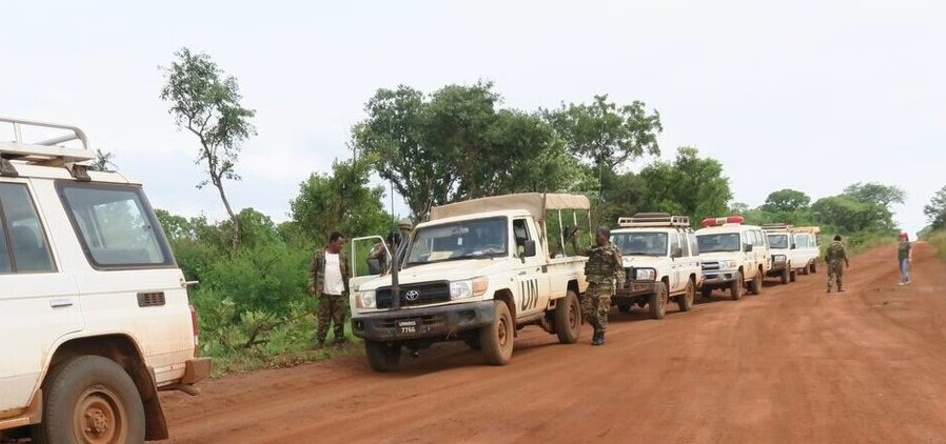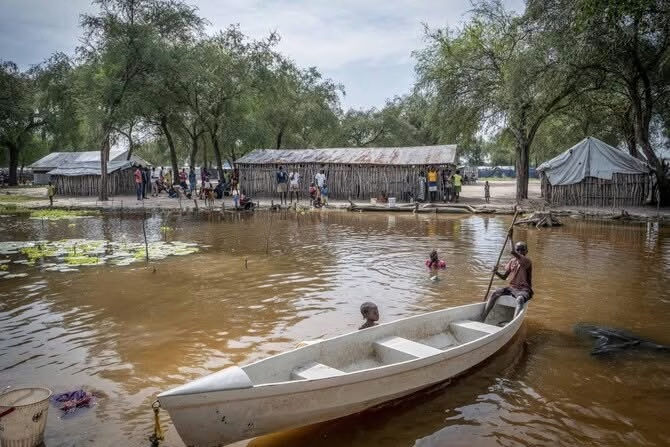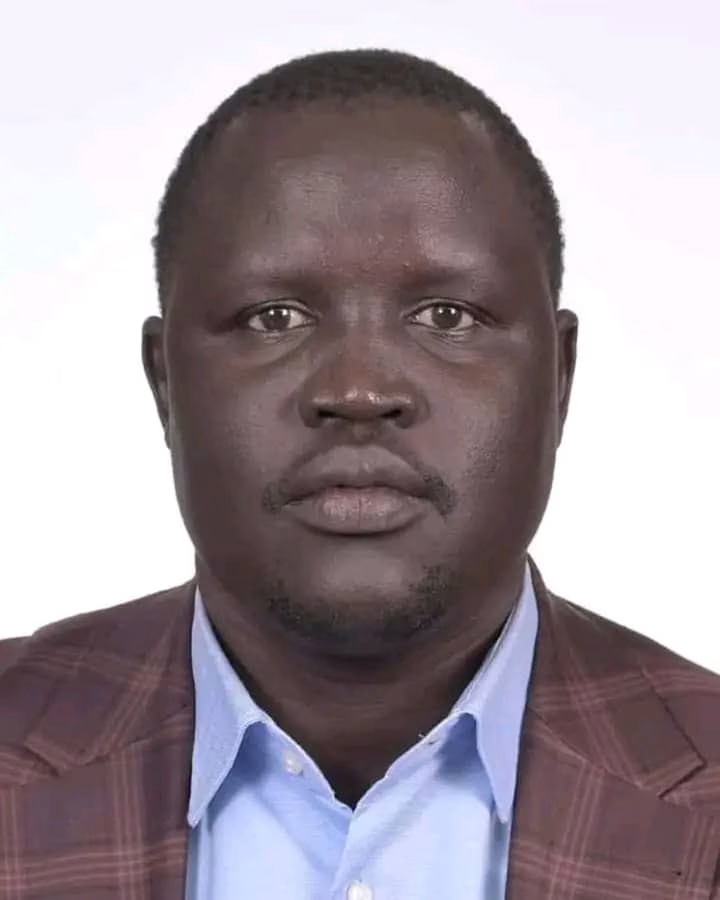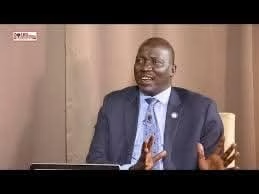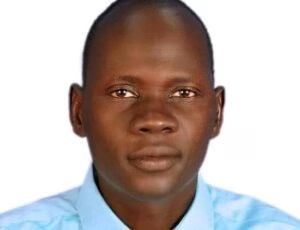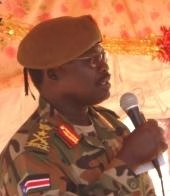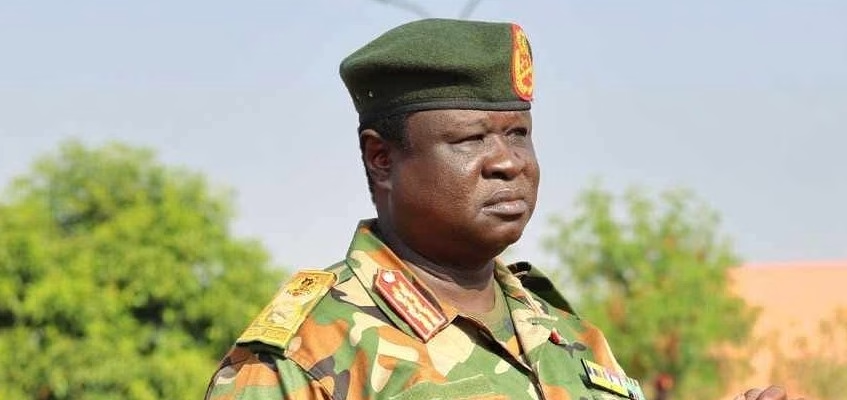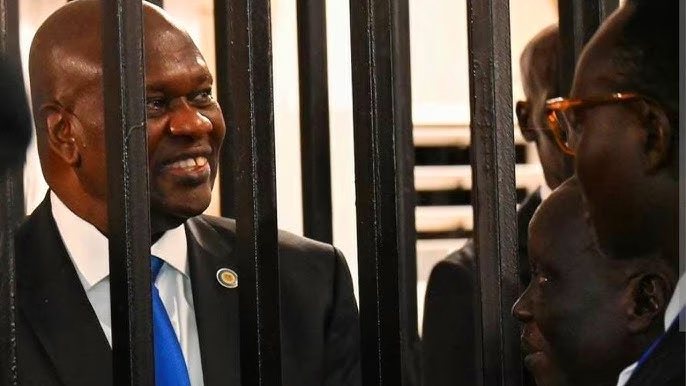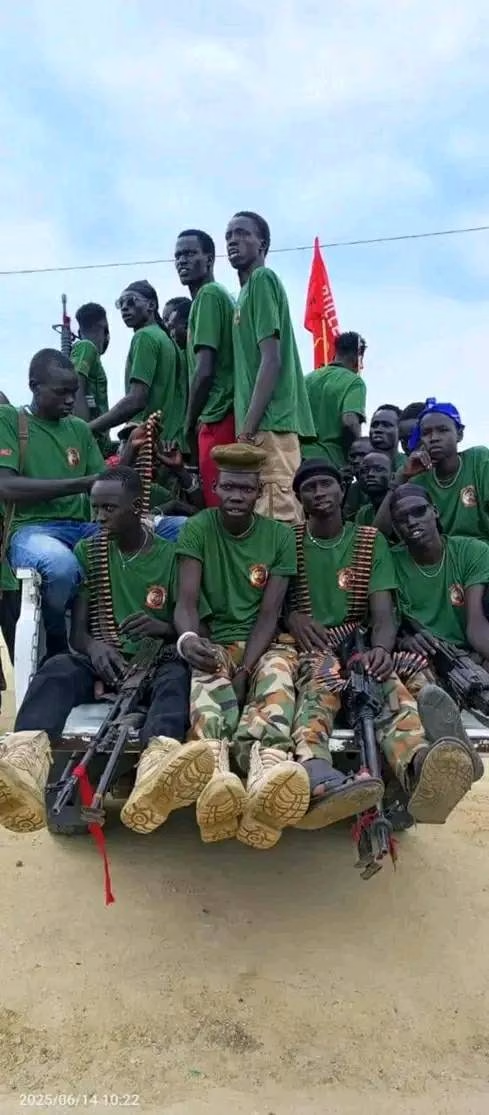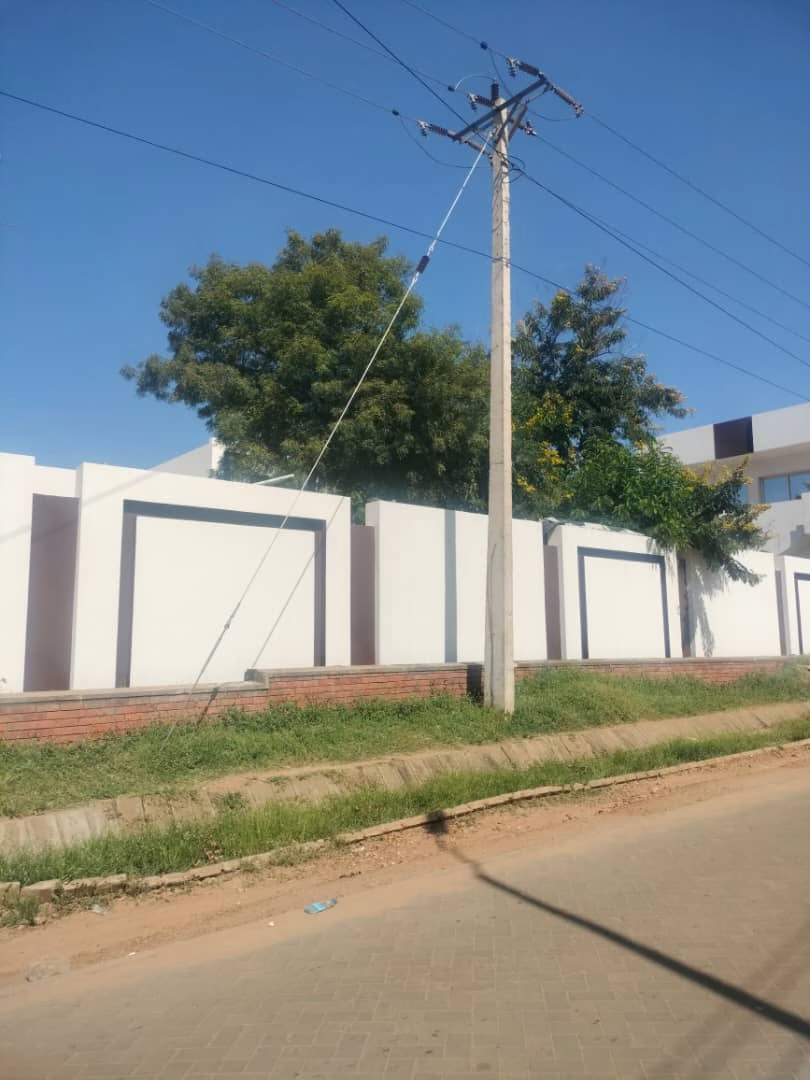The present report is submitted pursuant to Security Council resolution 2779 (2025). It covers political and security developments, the humanitarian and human rights situation and progress towards implementation of the mandate of the United Nations Mission in South Sudan (UNMISS) between 1 April and 15 July 2025.
Political and economic developments
The reporting period was marked by political volatility and tensions among the Parties to the Revitalized Agreement on the Resolution of the Conflict in South Sudan, including the formation of a splinter faction of the Sudan People’s Liberation Movement-Army in Opposition (SPLM/A-IO) following the house arrest of the First Vice-President and Chair of SPLM/A-IO, Riek Machar. Consequently, little progress on the implementation of the Revitalized Agreement was observed.
The Deputy Chair of SPLM/A-IO, Nathaniel Oyet Perino, addressed a statement to the visiting Panel of the Wise of the African Union on 1 April, requesting that the Panel meet with the First Vice-President. The Council of Ministers has not met since March. On 2 April, the Panel met the President of South Sudan, Salva Kiir Mayardit, but was prevented from meeting Mr. Machar. On the same day, the Government stated that the First Vice-President and other detained SPLM/A-IO members were being investigated and would face a fair trial.
In a statement dated 7 April, SPLM/A-IO accused several party members of collusion with the Sudan People’s Liberation Movement (SPLM), including the Minister of Peacebuilding, Stephen Par Kuol, and announced their suspension. However, on 9 April, Mr. Par Kuol held a meeting with some party members in Juba and formed a new interim leadership, with himself as Chair. SPLM/A-IO declared this action null and void, alleging that it had been achieved through the intimidation of Juba-based members.
On 26 April, SPLM and signatory affiliates outlined a “strategic response” to the Nasir clashes and to the takeover of the town by the White Army in March. The document included allegations that the White Army was under the command of SPLM/A-IO, the categorization of Nuer communities as either “friendly” of “hostile” and a call for recognition of the splinter faction of SPLM/A-IO and the expedited
unification of forces. SPLM/A-IO responded that the document represented a unilateral position and accused the South Sudan People’s Defence Forces, affiliated militias and the Uganda Peoples’ Defence Forces of breaching transitional security arrangements and the ceasefire.
On 5 and 6 May, a delegation led by the Chairperson of the African Union Commission and the Deputy Executive Secretary of the Intergovernmental Authority on Development (IGAD) visited Juba. The delegation met with the President and reaffirmed its support for the Government’s efforts to implement the Revitalized Agreement. Their request to meet the First Vice-President was not granted.
On 8 May, the Chairperson of the National Elections Commission met with the President, and later with the Vice-President for the Economic Cluster, Benjamin Bol Mel, to discuss urgent issues to be addressed in order to make progress towards elections. The Chairperson also submitted a budget proposal of $22 million for pre-election activities. On 20 June, the President instructed the Ministry of Finance to release funds for the electoral process.
On 18 May, 18 members of the SPLM/A-IO Political Bureau in Juba, including the Minister of the Interior, Angelina Teny, and the Minister of Mining, Martin Abucha, signed a statement rejecting Mr. Par Kuol’s faction and calling his leadership illegitimate.
On 20 May, Mr. Par Kuol’s splinter faction attempted to suspend 33 SPLM/A-IO members, removing them from government posts and Revitalized Agreement mechanisms. SPLM/A-IO rejected his authority to do so the next day.
Also on 20 May, Mr. Kiir, as SPLM Chairperson, removed the SPLM Deputy Chairpersons, James Wani Igga, Daniel Awet and Kuol Manyang. Mr. Igga was replaced as First Deputy Chairperson by Mr. Bol Mel. At his swearing-in ceremony, Mr. Bol Mel said that the South Sudan People’s Defence Forces were the only legitimate army and that “political parties with private armies” could not participate in the peace process or elections.
On 3 and 4 June, the Special Envoy for South Sudan of IGAD, Ismail Wais, convened a consultative meeting in Juba with regional and international partners on the current crisis in the country. Partners agreed on the urgent need for a ceasefire and resolved that the IGAD Council of Ministers should elevate the discussion to the Head of State level and form a committee, comprised of Djibouti, Ethiopia and Kenya, to engage with the leadership of the Parties to the Revitalized Agreement.
On 4 June, the President reconstituted the high-level ad hoc committee on the implementation of the Revitalized Agreement with 31 appointees, removing former SPLM/A-IO members and including members from the Par Kuol splinter faction. He mandated the Committee to oversee implementation of the remaining tasks under the Revitalized Agreement, except those of chapter II, and to coordinate with the National Elections Commission on elections. On 17 June, the Committee held an inaugural meeting and resolved to operationalize article 8.4 of the Revitalized Agreement, which provides for procedures required to amend the Agreement.
On 9 June, the South Sudan People’s Defence Forces announced the recruitment of 4,000 new personnel across the country, including 3,000 for the riverine force.
On 12 June, the African Union Peace and Security Council met to discuss South Sudan. In its subsequent communiqué, the Council emphasized the importance of fully implementing the Revitalized Agreement and called for the immediate and unconditional release and reinstatement into the Reconstituted Transitional Government of National Unity of the First Vice-President and other dismissed and detained SPLM-IO officials.
Throughout the period, there were several reshuffles of senior officials by presidential decree. On 27 May, the President appointed a former Governor of Western Bahr el-Ghazal, Sarah Cleto Rial, as Minister for Health, a move that SPLM/A-IO dismissed as unilateral. On 7 July, the President removed General Paul Nang as Chief of Defence Forces and replaced him with General Dau Aturjong. The President also removed and replaced the Chief Justice, the Central Bank Governor, the governors of Warrap and Central Equatoria States and the Administrator of the Greater Pibor Administrative Area.
Economic situation
The cost of the minimum expenditure basket for a household increased to 678,767 South Sudan pounds (SSP) in June, compared with SSP 546,963 in March. The consumer price index also increased by 89 per cent between August 2024 and May 2025, according to the National Bureau of Statistics. The continued rise in prices has reduced the purchasing power of ordinary households and their ability to access basic necessities.
On 19 May, the Ministry of Finance directed all government accounting officers to facilitate payment of salaries through personal accounts at commercial banks, as part of public financial management reforms. The Government committed to paying salaries on the twenty-fourth of every month, but there were arrears of six to nine months in the payment of civil servants’ salaries as at 15 July, according to government officials.
The unofficial exchange rate stabilized at SSP 6,000 to the dollar during the period due to a shortage of South Sudan pounds in the market and the banking system. The official exchange depreciated from SSP 4,530 to the dollar on 2 April to SSP 4,593 to the dollar on 15 July because of low foreign exchange reserves at the Bank of South Sudan.
From 11 to 20 June, the International Monetary Fund and South Sudan negotiated a nine-month staff-monitored programme to support South Sudan in designing and implementing policies and reforms to strengthen its economic resilience, enhance macroeconomic stability, restore sustainability and improve governance and transparency.
III. Security situation
The security situation in the greater Upper Nile region continued to deteriorate, and political violence persisted. Increased operations by the South Sudan People’s Defence Forces against SPLM/A-IO and allied groups prompted large-scale displacement and humanitarian concerns. Central and Western Equatoria experienced increased political tensions accentuated by defections and confrontations between the South Sudan People’s Defence Forces and SPLM/A-IO as well as with National Salvation Front elements, raising protection concerns. Cattle-related intracommunal violence continued to affect security along the tri-State border region of Warrap, Lakes and Unity States, particularly affecting the greater Tonj region.
Greater Upper Nile region
The South Sudan People’s Defence Forces and allies conducted military operations to retake areas under the control of SPLM/A-IO and local White Army factions in Upper Nile and Jonglei States. Air and ground attacks led to the killing of 129 civilians (94 men, 13 women, 21 boys and 1 girl) and the displacement of over 300,000 (168,000 internally and 132,000 to neighbouring countries).
In Upper Nile, the South Sudan People’s Defence Forces recaptured Ulang and Nasir Counties on 17 and 20 April, respectively. On 26 May, 176 South Sudan People’s Defence Forces personnel of Murle ethnicity reportedly abandoned their posts in Nasir, citing non-payment of salaries. Clashes continued, and on 14 July, SPLM/A-IO attacked the South Sudan People’s Defence Forces in Maiwut.
In Jonglei, the South Sudan People’s Defence Forces dislodged SPLM/A-IO from Diel and Atar on 22 April, displacing civilians to Malakal and Doleib Hill, Upper Nile, and carried out attacks and aerial bombardments in Old Fangak and New Fangak towns and in Pigi County between 3 and 15 May, which resulted in 40 civilians killed and 59 injured. Essential infrastructure, including a health facility operated by humanitarian actors, was destroyed. These attacks prompted the evacuation of 27 aid workers from Fangak County to Juba. Further bombardment combined with aerial, ground and riverine assaults destroyed the Fangak County headquarters, a non-governmental organization office, a warehouse and a dyke and was followed by the capture of the Pigi County Commissioner’s compound. On 22 May, an aerial bombardment in Old Fangak killed 27 SPLM/A-IO soldiers and displaced an unknown number of civilians amid reports that the attacks had been targeted at locations occupied by internally displaced persons. Following clashes between the South Sudan People’s Defence Forces and forces allied with SPLM/A-IO on 11 June, New Fangak was captured after SPLM/A-IO vacated the town due to fears of aerial bombardment.
Meanwhile, the cattle-related intercommunal violence in Jonglei and the Greater Pibor Administrative Area resulted in 30 killed (22 men, 4 women and 4 boys), 36 injured (33 men, 2 women and 1 girl) and 10 abducted (2 women, 5 boys and 3 girls).
Greater Equatoria region
In Central and Western Equatoria, the security situation remained tense, with SPLM/A-IO and National Salvation Front elements allegedly perpetrating crimes including looting, harassment and the abduction of both civilian and humanitarian workers. South Sudan People’s Defence Forces operations to dismantle SPLM/A-IO bases across Western and Central Equatoria led to clashes resulting in five civilians killed (four men and one woman), eight injured (six men and two women), 89 abducted (67 men, 16 women and 6 boys) and 18,700 internally displaced.
In Western Equatoria, on 1 April, the South Sudan People’s Defence Forces unsuccessfully attempted to capture Kedibo, an SPLM/A-IO stronghold. Instead, SPLM/A-IO, with reinforcement from Mundari armed youth, destroyed the Sue bridge, which prevented the advancement of the South Sudan People’s Defence Forces. On 17 June, the South Sudan People’s Defence Forces captured Kedibo without any resistance from SPLM/A-IO.
In Central Equatoria, during April, simultaneous ground and aerial operations in Morobo and Yei River Counties forced SPLM/A-IO to retreat into Morobo. On 25 April, the South Sudan People’s Defence Forces captured SPLM/A-IO positions in Morobo and Yei River Counties. Aerial bombardments during this operation resulted in civilian displacement into neighbouring Democratic Republic of the Congo and Uganda. Between 1 and 4 May, the South Sudan People’s Defence Forces took control of Tali and Tindalo, Terekeka County, following the withdrawal of SPLM/A-IO.
In early May, SPLM/A-IO carried out ambushes and clandestine attacks. Notably, on 1 and 2 May, SPLM/A-IO attacked Yaribe, Morobo County, where the South Sudan People’s Defence Forces suffered significant casualties. Between 2 and 4 May, SPLM/A-IO ambushed the South Sudan People’s Defence Forces in three incidents
along the Mangoya-Panyume, Kajo Kaji-Panyume and Panyume-Busia roads towards Uganda, killing at least two government forces members.
The reporting period also witnessed reported defections. Between 11 and 28 April, over 2,000 South Sudan Opposition Alliance forces defected to the South Sudan People’s Defence Forces, 113 SPLM/A-IO soldiers defected to the National Security Service, and 115 SPLM/A-IO police officers defected to the South Sudan National Police Service.
Greater Bahr el-Ghazal region
Intercommunal cattle-related conflicts in the tri-State border area caused civilian casualties, property damage and community displacement. This violence by armed youths extended to attacks on security organs including the South Sudan People’s Defence Forces. The South Sudan National Police Service experienced recurrent attacks on police stations resulting in deaths and injuries. Between 1 April and 15 July, 158 incidents were recorded, resulting in 515 civilians killed (471 men, 28 women, 10 boys and 6 girls), 406 injured (330 men, 61 women, 6 boys and 9 girls) and an unspecified number of cattle raided across the region.
Between 1 and 15 July, a spike in clashes between allied Dinka Luanyjang- Dinka Pan-Juaj and Dinka Jalwau in Wunlit Payam and other locations in Tonj East and Tonj North Counties resulted in 469 casualties and over 48,000 civilians internally displaced.
On 3 May, clashes between Dinka Thiik and Dinka Akok spilled over when Dinka Thiik attacked the South Sudan People’s Defence Forces compound in Ayat, Tonj East, prompting the forces to desert and relocate to Romic, Langchok and Marial Lou in Tonj East and Tonj North. The attack was to avenge an incident on 26 April in which Dinka Akok had been supported by the South Sudan People’s Defence Forces. A subsequent attack on 4 May by the Dinka Twic resulted in two South Sudan People’s Defence Forces members killed and four others injured.
In response to the deteriorating security situation, the President declared a six- month state of emergency on 6 June in Warrap and in Mayom County, Unity State, due to escalating intercommunal violence, and on 9 June, the South Sudan People’s Defence Forces announced the beginning of a disarmament campaign.Humanitarian situation
The humanitarian situation has deteriorated compared with the previous reporting period due to ongoing violence and a lack of humanitarian access to affected populations. As of June, 77 per cent of the population of South Sudan was in need of humanitarian assistance and protection. Between April and July, an estimated 7.7 million people were projected to face high levels of acute food insecurity (Integrated Phase Classification (IPC) Phase 3 or above). Approximately 83,000 are expected to face catastrophe levels of food insecurity (IPC Phase 5) in Pibor, Nasir and Ulang Counties. Over 2.3 million children under 5 years of age are at risk of acute malnutrition in 2025. Humanitarian partners are supporting authorities to ensure the delivery of live-saving services to address the needs of children.
South Sudan continues to face its most severe cholera outbreak, with 80,000 cases and 1,463 deaths reported across 55 counties in nine States and three administrative areas. The situation is reportedly deteriorating, driven by declining immunity levels and the onset of the rainy season. As at 15 July, over 6.9 million doses of oral cholera vaccine have been administered across affected counties, with national coverage currently at 84 per cent of a targeted 8.2 million doses.
Since the escalation of armed clashes, an estimated 305,000 individuals have been uprooted across the country, mostly in Upper Nile and Jonglei States. Of those 305,000, about 132,000 have sought refuge in neighbouring countries: an estimated 23,000 in the Democratic Republic of the Congo, 35,000 in Ethiopia, 51,000 in the Sudan and 23,000 in Uganda. The internally displaced populations are said to be confined to remote and hard-to-reach areas due to ongoing insecurity and flooding, which continue to hinder return and onward movement. The conflict has severely disrupted humanitarian operations in affected States.
In an inter-agency assessment conducted on 22 May, it was reported that an estimated 18,700 people had been displaced by armed clashes in Morobo County, Central Equatoria State.
South Sudan continued to receive large numbers of people fleeing the conflict in the Sudan. The number of arrivals since 1 January totalled 198,000, of whom most were South Sudanese returnees. However, humanitarian operations to support arrival, health screening, temporary shelter and onward transport were reduced due to funding shortages.
The delivery of humanitarian aid in South Sudan remains challenging due to insecurity, violence against aid workers and assets, poor infrastructure, access limitations and administrative impediments. International humanitarian funding has been sharply reduced, resulting in the closure or reduction of medical services, reduction of nutritional provision to focus on malnourished children, and reduction of other food rations. According to the Office of the United Nations High Commissioner for Refugees, some 100,000 vulnerable people have lost access to shelter and essential relief items since May due to the humanitarian funding cuts. Between April and June, 142 incidents related to humanitarian access were reported, compared with 99 reported between January and March. Access remains particularly challenging in areas most affected by the ongoing conflict, especially in Upper Nile and Jonglei States. On 23 June, the World Food Programme and partners were able to access airdrop locations to deliver food items targeting over 30,000 people in Nasir and Ulang Counties.
- In Upper Nile State, the conflict led to the looting of two health facilities in Nasir County and three in Ulang County. Air bombardment damaged four non-governmental organization facilities, with others looted or damaged in ground conflict. Overall, 200 schools in Longochuk, Ulang and Nasir were closed. On 10 June, Médecins sans frontières (international) announced the closure of its hospital in Ulang, as well as the withdrawal of support for 13 primary health facilities, citing safety concerns.There were four incidents of abduction of humanitarian workers in Yei County, Central Equatoria State, within five weeks. Most recently, on 5 June, 13 aid workers from an international non-governmental organization were reportedly abducted for ransom by unidentified armed individuals along the Yei–Mugwo road.
- As at 15 July, the 2025 Humanitarian Needs and Response Plan for South Sudan – for which $1.7 billion is sought to assist 5.4 million people – was only 22 per cent funded.
- Implementation of the Mission’s mandated tasks
- Supporting the implementation of the Revitalized Agreement and the peace process
- UNMISS continued to exercise its good offices, expressing concern at the reversal of gains made in the peace process, especially trust between the parties. In this context, UNMISS leadership held consultations with 216 civil society representatives (including 79 women) on 5 June.
- UNMISS continued to support civil society organizations in promoting peace and social cohesion. On 27 and 28 May, UNMISS facilitated a national civil society organizations conference in Juba for 52 representatives (including 18 women) from across the country. The initiative served to strengthen the capacity of civil society to engage effectively in collaborative advocacy regarding the country’s political and security landscape. The conference concluded with a commitment to appoint State- level focal points to form a national coordination framework. Follow-up meetings were conducted in all States in June to disseminate the outcomes of the conference to communities.
- UNMISS supported the National Constitutional Review Commission in preparing for a constitution-making process. In May, the Mission facilitated an external expert review of the Commission’s workplans, culminating in revised plans to ensure pragmatic and timely civic education and public consultations. In May and June, UNMISS supported workshops led by civil society, which were focused on women’s leadership in the constitution-making process and engaged 349 participants (including 326 women). The Mission supported awareness-raising on women’s participation in political processes across women’s networks through community outreach initiatives in Western Equatoria in April and Jonglei in May.
- UNMISS promoted youth inclusion in governance. This included supporting workshops for university students together with the National Youth Union and the Ministry of Youth and Sports in May (92 participants, including 49 women) and in partnership with the United Nations Educational, Scientific and Cultural Organization to promote inclusive governance and combat hate speech in June (92 participants, including 40 women), as well as an outreach event with young people in universities in June (443 participants, including 176 women).
- UNMISS supported two workshops in June on overcoming barriers and promoting access for persons with disabilities to electoral processes and improving their equitable participation. The training was targeted at 52 members of the National Elections Commission, State High Election Committees and civil society representing all 10 States.
- UNMISS facilitated capacity-building activities targeting key electoral institutions and their engagement with stakeholders, including the National Elections Commission, the South Sudan National Police Service, civil society, young people and media, reaching 916 beneficiaries (35 per cent women). Following a nationwide dialogue on 29 May between civil society representatives and the National Elections Commission, a communiqué was issued by civil society organizations, calling for political dialogue, government action to advance elections and the opening up of political and civic space. From 10 to 20 June, UNMISS supported the training of National Elections Commission representatives and civil society organizations ahead of the launch of an election-focused civic education campaign nationwide.
- UNMISS, through quick-impact projects, and the United Nations Development Programme provided support to operationalize State High Election Committee offices in all 10 States, including the refurbishment of existing structures in six States and ground-up construction in four, in addition to the provision of information technology equipment, complementing government-funded initiatives through the National Elections Commission.
- In May, in support of transitional justice and chapter V of the Revitalized Agreement, UNMISS provided technical assistance to the Transitional Justice Working Group and the South Sudan Civil Society Forum to convene a stakeholders’ conference to deliberate on the nomination of representatives to the selection panel for South Sudanese Commissioners of the Commission for Truth, Reconciliation and
Healing. With 85 participants (43 women), the group discussed advocacy for the inclusion and participation of all stakeholders in the transitional justice processes.
- UNMISS provided support to the Transitional Justice Working Group to hold a forum on advancing justice through civil society and stakeholder collaboration, which was attended by 70 participants (including 21 women). Similarly, UNMISS supported the non-governmental organization Alba Foundation to conduct a workshop for vulnerable groups (34 participants, including 29 women) on their inclusive participation in transitional justice process.
- To enhance civic and political space, in April, UNMISS supported the Transitional National Legislative Assembly in reviewing the Cybercrime Bill and organized outreach activities, including a public hearing. Eight “Democracy in Action” and five “Round-table Discussions” radio shows increased public awareness of good governance and contributed to expanding the space for public discussions on sensitive and current political issues. In June, UNMISS held three county-level trust- and confidence-building forums in Lakes, as an outcome of the 2024 Lakes State political forum. The forums, attended by 180 participants (30 women), led to the establishment of county-level committees to advance the expansion of civic and political space.
- Protection of civilians and mitigating intercommunal conflict
- UNMISS continued to deploy peacekeepers to patrol main supply routes and hotspots, to project force and to support the protection of civilians. The UNMISS force conducted 14,665 patrols, including 709 integrated patrols comprising United Nations police and civilian personnel.
- United Nations police conducted 6,007 patrols across South Sudan, including 45 integrated patrols and 4,687 patrols with women officers, with a significant increase in its operational presence in Juba, where the force intensified patrols around internally displaced person camps in response to security concerns raised by community leaders. Over 1,213 personnel in quick response teams were on standby to support policing efforts in Juba, Malakal and Bentiu. Twenty-seven police officers were deployed to five company operating bases to enhance confidence-building, leadership engagement and service delivery for local communities.
- To enhance peacebuilding, conflict management and social cohesion, UNMISS facilitated the implementation of 28 programmes targeted at 3,905 participants (1,023 women) in Central Equatoria, Northern and Western Bahr el-Ghazal, Jonglei, Warrap and Upper Nile States.
- To strengthen conflict prevention and peaceful co-existence mechanisms, UNMISS organized 12 cattle migration conferences and the dissemination of resolutions in four States, targeting 1,582 participants from host communities and pastoralists from the Sudan. The conferences served to identify challenges during the previous migration season with a view to overcoming them for future migrations.
- To mitigate the recurring cycle of intercommunal conflict in Warrap, UNMISS convened a dialogue for greater Tonj East community leaders on 29 and 30 April. The Mission continued to ensure a sustained presence in Tonj East through regular patrolling. In early June, an integrated patrol engaged with local leaders in Akok, Ngab-Agok and Wun Lit, Tonj East County, to restore peace and prevent further violence. The patrol team facilitated the formation of a local committee comprising chiefs, cattle camp leaders and young people to dismantle illegal checkpoints set up by armed groups.
- From 9 to 13 April, UNMISS, the United Nations Interim Security Force for Abyei and partners facilitated a peace dialogue for Dinka Twic and Ngok young people from Warrap State and Abyei. The young people pledged to cease hostilities and established a joint monitoring framework to support the outcomes of the peace dialogue. Follow-up trust building engagements were also held. No security incidents have been reported between the two communities since the dialogue.
- To promote reconciliation amid ongoing ethnic and political polarization in Upper Nile, UNMISS organized an intercommunal dialogue in Ulang on 21 and 22 April. The Mission facilitated further mediation following a spike in revenge killings and promoted reconciliation and social cohesion in Maban County. A civil- military dialogue was also supported in Malakal on 6 and 7 May.
- To bolster the creation of a secure environment in Eastern Equatoria, a UNMISS community violence reduction project provided vocational training to 160 beneficiaries (42 women), including young people and ex-combatants, as peace ambassadors, in order to create income-generating opportunities as alternatives to violence.
- UNMISS enhanced the capacity of law enforcement and local authorities to protect civilians, training 622 local actors (including 242 women) on the responsibility of the State to protect civilians and the responsibilities of participants within this framework. Moreover, the Mission strengthened the capacity of 44 representatives of local authorities (including 12 women) and communities on the implementation of the national action plan on return, reintegration and recovery. United Nations police also conducted 171 workshops for 5,081 South Sudan National Police Service personnel (including 1,462 women) on electoral security, violence against women in elections, child protection and the investigation and prosecution of sexual and gender-based violence and conflict-related sexual violence cases.
- The Mine Action Service responded to 215 requests from UNMISS and local communities for the identification, removal and disposal of explosive ordnance, enabling communities to safely access 132 agricultural areas and 22 water sources, which facilitated food production and water access in previously contaminated areas. In total, 1,108,355 m2 of land were cleared and 3,503 explosive items destroyed, contributing to a safer environment for local populations. The Mine Action Service also delivered explosive ordnance risk education to 80,599 individuals (15,059 women, 27,756 boys and 24,764 girls), including 3,880 displaced by the conflict in the Sudan, reducing the risk of accidents and enhancing community safety.
- UNMISS launched quick-impact projects to enable a protective environment. These included a prison in Eastern Equatoria; a primary school and a courthouse in Northern Bahr el-Ghazal; the drilling and installation of one of three boreholes in Warrap to benefit 3,000 community members; three police stations; a State Commission for Human Rights office; and a secondary school in Western Bahr el- Ghazal. UNMISS also renovated a State Legislative Assembly building; three primary schools and a maternity ward in Lakes; a primary health care centre (maternal health) in Warrap; two primary health centre units in Northern Bahr el-Ghazal to serve an estimated 11,299 individuals (including 2,825 women), including persons with disabilities and 2,000 returnees; and three solar-powered water yards in Lakes and Northern Bahr el-Ghazal States. In Western Equatoria, a special protection unit to support gender-based violence survivors was inaugurated, and in Jonglei, 50 internally displaced persons, returnees and host community members benefitted from a vocational project promoting conditions conducive to return and reintegration.
- Creating conditions conducive to the delivery of humanitarian assistance
- UNMISS continued to provide security for humanitarian assistance delivery through the protection of convoys. During the reporting period, the Force conducted 179 long-duration patrols, 1,460 short-duration patrols and 1,055 force protection tasks to help create conditions conducive to the delivery of humanitarian assistance.
- The Mine Action Service mitigated the threat of explosive ordnance in support of humanitarian aid delivery by clearing 1,918,524 m2 of land, including resettlement initiatives led by the United Nations High Commissioner for Refugees and the International Organization for Migration. The Service surveyed or cleared 497 km of routes, enabling the safe movement of UNMISS patrols and facilitating the rehabilitation of main supply routes.
- Monitoring and investigating human rights violations
- UNMISS documented and verified 358 incidents of human rights violations and abuses affecting 1,974 civilians, including 151 women and 106 children (77 boys and 29 girls). A total of 856 civilians were killed, 792 were injured, 117 were abducted and 209 were arbitrarily arrested and detained (see figure I). Community-based militias and civil defence groups accounted for 62 per cent of the incidents, while 30 per cent were attributed to conventional parties to the conflict and other armed groups and 8 per cent to unidentified or opportunistic armed elements. UNMISS documented seven extrajudicial executions by security personnel in Warrap State.
Figure I
Number of victims by State and type of violation
Central Equatoria Eastern Equatoria Jonglei Lakes Northern Bahr el-Ghazal Unity Upper Nile Warrap Western Bahr el-Ghazal Western Equatoria
Source: United Nations Mission in South Sudan (UNMISS) Human Rights Division.
- UNMISS continued to monitor hate speech trends and promote a joint response involving government, civil society, media, and international actors. On 6 and 7 May 2025, UNMISS and the international organization Digital Rights Frontlines held a round-table discussion with 45 stakeholders (20 women) to enhance their capacity for monitoring and responding to hate speech and incitement to violence.
- In June, UNMISS, the United Nations Educational, Scientific and Cultural Organization and the South Sudan Human Rights Defenders Network held a dialogue with 40 key stakeholders (including 14 women) to assess the status of implementation
of the universal periodic review recommendations on fundamental freedoms for South Sudan. UNMISS also held a strategic round-table discussion with 60 government and civil society stakeholders (including 25 women) to develop collective strategies for enhancing civic and political rights and freedoms. Furthermore, in partnership with the Community Empowerment for Progress Organization and the National Elections Commission, UNMISS conducted a workshop on women’s rights and participation in the electoral processes (31 women and 4 men). UNMISS also trained 42 police officers (including 12 women) on fundamental freedoms, human rights-based policing and the roles of police in election security.
(a) Children and armed conflict
- Grave violations, particularly the killing and maiming of children, persisted, driven by air and ground assaults in populated areas, affecting civilian infrastructure, notably healthcare facilities and schools, in Upper Nile.
- UNMISS verified 127 grave violations against 95 children (66 boys, 24 girls, 5 sex unknown). Some 77 children were victims of killing (32 boys, 15 girls, 3 sex unknown) and maiming (19 boys, 6 girls, 2 sex unknown), and 15 boys were recruited and used. Of the 95 children, eight children (five boys, three girls) suffered multiple violations. One boy was abducted, recruited and used; another was abducted, recruited, used and injured in combat; one boy was recruited, used and killed in combat; and two boys were abducted, recruited, and used. Three girls were abducted and raped.
- The 127 grave violations occurred in Unity (40), Jonglei (29), Upper Nile (19), Western Equatoria (18), Central Equatoria (12) and Lakes (9) States (see figure II). A total of 38 were attributed to unidentified perpetrators, including 27 in crossfire, 7 by unknown perpetrators and 4 from explosive remnants of war. Some 80 violations were attributed to the South Sudan People’s Defence Forces, 7 to SPLM/A-IO and 2 to the National Salvation Front.
- In addition, 15 incidents of attacks on hospitals (9) and schools (6) and 9 verified incidents of denial of humanitarian access for children were recorded. UNMISS also verified the military use of two schools and the separation of five boys by the South Sudan People’s Defence Forces (3) and SPLM/A-IO (2) in Western Equatoria (2), Lakes (2) and Central Equatoria (1).
Violations against children by State and type
Western Equatoria Upper Nile Unity Lakes Jonglei Central Equatoria
Abduction
Attack on schoolsn. Military use of schools Recruitment and use of children
Attack on hospitals. Denial of humanitarian access Rape and sexual violence Killing and maiming
- UNMISS delivered 83 child protection awareness-raising sessions to 3,126 participants (including 1,220 women) and 25 child protection training sessions to 1,229 participants (including 287 women).
(b) Conflict-related sexual violence
- In April, Central Equatoria State experienced a worrisome rise in the number of conflict-related sexual violence survivors linked to ongoing military operations.
- Nationwide, UNMISS documented and verified a total of 31 incidents of conflict-related sexual violence affecting 74 survivors, comprising 50 women and 24 minors (all girls) ranging in age from 10 to 70 years. At least 20 survivors were able to receive medical and psychological support, and 36 pursued legal action. The incidents occurred in Western Equatoria (nine), Central Equatoria (seven), Jonglei (six), Unity (four), Western Bahr el-Ghazal (four) and Eastern Equatoria (one) and were attributed to the South Sudan People’s Defence Forces, unidentified armed elements, community-based militias, SPLM/A-IO and the National Salvation Front.
- UNMISS conducted 85 outreach and capacity-building activities across the country to mark the International Day for the Elimination of Sexual Violence in Conflict on 19 June. Radio shows and a social media campaign were used to reach the public, and technical support was provided to the South Sudan Council of Churches and the Islamic Council of South Sudan on messaging related to conflict-related sexual violence.
- Cross-cutting issues
1. Rule of law and accountability - UNMISS provided technical and logistical support to the judiciary in developing its five-year strategic plan (2025–2029). The plan is focused on judicial independence, access to justice, accountability and gender mainstreaming.
- During the reporting period, UNMISS supported the investigation and mobile trial of 93 cases (49 criminal) in Leer, Unity State; Maban, Upper Nile; Pibor, Greater Pibor Administrative Area; and Gogrial East, Warrap. Of the criminal cases, 10 were related to sexual and gender-based violence. The trials resulted in 41 convictions, including one for forced marriage in Leer.
- Between 19 May and 7 July, UNMISS provided technical and logistical support to the Military Justice Directorate of the South Sudan People’s Defence Forces as it investigated alleged crimes in Jur River County, Western Bahr el-Ghazal, and convened a general court martial in Wau, which addressed both the cases from Jur River and other outstanding cases. A total of 20 cases were adjudicated, including two gender-based violence cases and one conflict-related sexual violence case, resulting in nine convictions implicating members of the South Sudan People’s Defence Forces and one conviction of a civilian. The investigation was initiated by the Directorate following allegations of violations, including sexual violence, committed by the South Sudan People’s Defence Forces.
- UNMISS continued to raise awareness about sexual and gender-based violence and build trust between citizens and law enforcement. Between 23 June and 4 July, the Mission supported the training of 20 national police officers (4 women) from Jonglei. On 11 and 12 June, the Mission also held a workshop in Boro Medina, Western Bahr el-Ghazal, for 50 community representatives and local government officials, including customary chiefs and law enforcement agents, and facilitated a women-only discussion.
- To address possible instances of unlawful detention, UNMISS supported interventions resulting in the release of 264 prisoners (12 women and 3 juveniles).
From 11 March to 29 April, UNMISS supported the deployment to Malakal, Upper Nile, of a county court judge, who decided on 92 cases and reduced the prison population from 301 to 117 inmates. Training sessions involving 592 officers (including 207 women) were conducted in all 10 State capitals and in Yei, Central Equatoria, on the management of vulnerable groups, prison security and management, and livelihood programmes.
- Women and peace and security
- During the reporting period, women’s representation in government reached 20 per cent, a reduction since the previous reporting period and below the 35 per cent quota in the Revitalized Agreement.
- Women’s rights organizations were adversely affected by insecurity and constrained civic and political space. UNMISS provided its good offices to support women signatories and other stakeholders in order to ensure sustained commitment to the Revitalized Agreement and the inclusion and participation of women in key dialogue tracks, including by providing space for aspiring young leaders. In this regard, the Mission convened a capacity-building workshop from 17 to 19 June for 90 young women leaders from across the country and from the civil, political and private sectors, with a focus on expanding civil and political space during electoral and constitution-making processes and the roles of women in those processes.
- UNMISS supported the creation of government-led subnational task forces to prevent and respond to sexual gender-based violence and conflict-related sexual violence in all 10 States. During the reporting period, the Mission, in partnership with the Women in Local Government Association, conducted capacity-building sessions for local administrators and traditional authorities on gender-based violence.
- Climate, peace and security
- South Sudan is likely to face severe flooding following above-normal rainfall since the start of the rainy season in April, in addition to the water yet to recede following the 2024 flood. The consequences are severe for vulnerable communities whose ability to self-relocate to high-ground areas is restricted by ongoing conflicts. Areas of recurrent flooding in Upper Nile, Unity, Lakes and parts of Jonglei are also epicentres of conflicts, constraining flood preparedness efforts and generating erratic displacement of the population.
- Climate-related disruption continues to aggravate conflicts between pastoralist groups and host communities. To mitigate such conflicts, UNMISS facilitated a dialogue in Renk County, Upper Nile, between Fellata, Ambororo and Arab nomads from the Sudan. Discussions served to highlight the impact of extreme flooding on traditional migration routes, which has led to encroachment on farmland and rising farmer-pastoralist tensions. Internally, UNMISS continued to build the capacity of its force personnel and the United Nations police to integrate climate security considerations into their operations.
- Mission staffing, the status of deployments, and conduct and discipline
- As at 29 May, the number of UNMISS civilian personnel stood at 2,276, comprising 883 international staff members, including 281 women (32 per cent) 1,393 national staff members, including 234 women (17 per cent), and 399 United Nations Volunteers, including 156 women (39 per cent).
- UNMISS police strength stood at 1,601 (of an authorized 2,101 personnel), comprising 696 individual police officers, including 210 women (30 per cent), 849 personnel in formed police units, including 220 women (26 per cent), and 56 government-provided personnel (of an authorized 88 personnel), including 20 women (36 per cent).
- Of the authorized 17,000 troops, UNMISS troop strength stood at 14,740 military personnel: 231 military liaison officers, including 72 women (32 per cent), 438 military staff officers, including 101 women (23 per cent), and 14,071 military contingent personnel, including 1,001 women (7 per cent).
- In accordance with the applicable policy, information on possible unsatisfactory conduct and/or misconduct was processed in a timely fashion. Between 1 April and 30 June, 26 allegations of misconduct were recorded in the case management tracking system. No allegations of sexual exploitation and abuse were recorded. All identified victims of previously reported allegations of sexual exploitation and abuse continued to receive support from the Senior Victims’ Rights Officer in South Sudan.
VII. Violations of the status-of-forces agreement, international humanitarian law and security of United Nations personnel
- From 1 April to 30 June, UNMISS recorded 521 incidents related to the status of-forces agreement, of which 514 involved movement restrictions imposed by government authorities, affecting UNMISS patrols in 10 States. UNMISS cancelled 466 dynamic air and ground patrols due to the non-acknowledgement of the UNMISS sharing of information and flight safety assurance documents by the Joint Verification and Monitoring Mechanism headquarters in Juba. In addition, it was previously unreported that between 21 and 31 March, the Mission had recorded 148 incidents related to the status of-forces agreement, including 145 movement restrictions and 135 cancelled dynamic air patrols.
- The significant increase in access denial incidents is attributed to the heightened insecurity in the country, as well as administrative challenges within the Joint Verification and Monitoring Mechanism headquarters, which affected the Mechanism’s timely acknowledgment of documents. Non-acknowledgement of documents forced UNMISS to cancel several of its planned patrols.
- Challenges related to the non-issuance of tax exemptions for the import of essential supplies, particularly petroleum products, by the Mission for its exclusive use continued in April. This led to critically low fuel stock levels available for Mission operations. The Ministry of Foreign Affairs and International Cooperation facilitated meetings between UNMISS and the Government Tax Exemption Committee. As these fuel stocks require constant replenishment, UNMISS has continued to engage the Government to reinstate the systemic and continuous issuance of tax exemptions, including through a workshop on United Nations privileges and immunities on 3 and 4 June with government stakeholders.
- On 28 April, a UNMISS force protection team en route to the Yei airstrip was stopped by South Sudan People’s Defence Forces soldiers in Yei town. The soldiers insisted on accompanying the UNMISS team to the airstrip, searched the cargo and demanded written clearances for all UNMISS flights to Yei.
- A total of 356 incidents affecting United Nations personnel and operations were recorded, of which approximately half (179 cases) related to cases of crime and harassment. The expansion of armed conflict during this period exacerbated instability, crime, road banditry and access challenges, which also negatively affected
the security of United Nations personnel. Of note, on 4 April, along the Bor-Pibor Road, armed perpetrators attacked the site of a project being implemented by a contractor working for a United Nations entity, and two United Nations contracted staff were shot dead.
- Senior United Nations management staff have faced threats from local populations regarding employment practices and opportunities, with budget cuts intensifying competition between communities for a reduced number of posts.
VIII. Performance optimization
- The UNMISS force conducted 20 evaluations. Units were found to be trained and operationally ready.
- United Nations police conducted evaluation and performance appraisal inspections and contingent-owned equipment inspections for five formed police units. While overall assessments were satisfactory, all units exhibited shortfalls in contingent-owned equipment, primarily due to the demolition and replenishment of expired ammunition. Each unit was placed on a performance improvement plan to address the gaps and ensure future compliance with operational standards.
- Observations and recommendations
- The relative stability ushered in by the Revitalized Agreement since 2018 stands at a precipice. The continued detention of key opposition figures, including the First Vice-President, and ongoing South Sudan People’s Defence Forces military offensives, particularly clashes with SPLM/A-IO and other armed groups across the country, are violations of the peace agreement and rapidly erode the gains made since its signing. I urge all signatories to cease hostilities and recommit to the principles of dialogue, inclusivity and consensus-building, release all detained political leaders and fully restore the Transitional Government of National Unity.
- The fractured trust between the principal parties continues to fuel insecurity. The current political violence significantly undermines the possibility of holding peaceful and credible elections. I call upon the parties to refrain from actions that erode the integrity of the Revitalized Agreement and, consequently, the credibility of elections.
- I remain seriously concerned about the deterioration in the security situation, particularly in Upper Nile, Jonglei and the Equatorias. The escalation of military operations, including aerial bombardments in civilian areas in violation of the ceasefire agreement, has resulted in hundreds of civilian deaths, large-scale displacement and the destruction of humanitarian infrastructure. I call upon the Government to cease aerial bombardments and uphold its obligations under international humanitarian law. All armed actors must respect the ceasefire and prioritize the protection of civilians.
- The involvement of neighbouring States in the political and security dynamics of South Sudan must be aligned with the objectives of the Revitalized Agreement. I welcome the ongoing efforts of the African Union and IGAD and encourage neighbouring countries to redouble their support for inclusive dialogue while ensuring that their engagements reinforce, rather than fragment, the peace process and advance solutions within the framework of the Revitalized Agreement.
- The human rights situation remains grave. Extrajudicial executions and the recruitment and use of children in conflict by community-based militias and parties
to the conflict are particularly egregious. I urge the Government of South Sudan to investigate and prosecute those responsible for these and all other violations and abuses and to strengthen national accountability mechanisms. I am concerned by the significant increase in violations of the status-of-forces agreement and call upon all parties to grant full and unhindered access to UNMISS to carry out its mandated tasks, including effective monitoring of and response to human rights concerns.
- I commend the sustained engagement of civil society, particularly women and young people, who continue to advocate peace, accountability and justice under very challenging circumstances. Their voices must be amplified and meaningfully included in all aspects of the transition.
- The humanitarian situation remains alarming. Renewed military offensives, climate shocks, disease outbreaks, a weak economy and the spillover effects of the conflict in the Sudan are compounding humanitarian distress. This is further accentuated by declining international funding.
- The escalation of conflict is also disrupting aid operations. I condemn the destruction of and damage to humanitarian infrastructure. I call upon all parties to guarantee safe and unimpeded humanitarian access and to refrain from actions that endanger aid workers or obstruct the delivery of life-saving assistance. The international community must also urgently scale up funding for the 2025 humanitarian response plan.
- Climate-related shocks, particularly flooding, are projected to affect over 1.4million people across six States, exacerbating vulnerabilities. I urge the Government and its partners to integrate climate resilience into peacebuilding and humanitarian strategies, including through the use of anticipatory action and preparedness mechanisms, and to support local conflict resolution mechanisms that address resource-based tensions.
- Economic constraints, particularly inflation and currency instability, have reduced household purchasing power. I urge the Government to prioritize public financial management reforms and to take concrete steps to restore public trust and strengthen core governance functions.
- Despite these challenging circumstances, the commitment of UNMISS, the United Nations country team, our non-governmental organization partners and humanitarian actors remains steadfast. The Mission continues to support the peace process, protect civilians and facilitate humanitarian access. I commend the military, the police and the civilian staff of UNMISS, under the leadership of my Special Representative, Nicholas Haysom, as well as the United Nations country team, for their tireless efforts. I also extend appreciation to the troop- and police-contributing countries that continue to provide essential personnel and resources for the work of the Mission.


